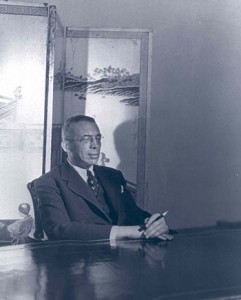Wiley, John Cooper (1893-1967)
A U.S. diplomat whose distinguished 38-year career took him from counselor at the first U.S. embassy in Soviet Russia in 1934 to many other key diplomatic postings — and who served during World War II at the Office of Strategic Services (OSS ), America’s first central intelligence agency.
Wiley (commonly known as John C. Wiley) was born in 1893 in Bordeaux, France, where his father was the American Consul. Educated by private tutors, he later studied at Union College for one year and attended Georgetown University Law School. In 1915 Wiley was appointed clerk at the American Embassy in Paris, and over the next 10 years he held a number of diplomatic posts in Europe and Latin America. In 1933 he returned to Washington and was appointed technical advisor to the U.S. delegation to the 1933 International Monetary and Economic Conference in London, which was convoked in order to find a way out of the Great Depression.
In March 1934, following the reestablishing of formal diplomatic relations between the United States and the Soviet Union, Wiley was posted at the U.S. Embassy in Moscow as Counselor and Consul General. In 1936 he became U.S. Consul General in Antwerp, Belgium; in July 1937, he was transferred to the U.S. Legation in Vienna, where he was one of the first to warn of Hitler’s imminent takover of Austria. He also helped several prominent Austrian-Jews (including Sigmund Freud)to escape after Nazi Germany annexed Austria in 1938. In July 1938, Wiley was appointed U.S. Envoy Extraordinary and Minister Plenipotentiary to Latvia and Estonia. 1 This appointment was interpreted at the time by Newsweek magazine as “establishing an American clearing-house in Riga on information about the USSR.” 2 However, that posting came to an abrupt end when the Baltic countries were absorbed by the Soviet Union in 1940.
In 1941, Wiley was recruited by the Roosevelt Administration to run the Foreign Nationalities Branch (FNB) established within the Office of Coordinator of Information (COI) — the predecessor of the Office of Strategic Services (OSS), which handled American wartime strategic intelligence. Wiley hired another former diplomat, DeWitt C. Poole, to supervise the FNB’s day-to-day operations, which included recruiting multilingual staff, cultivating contacts with exiles and monitoring the foreign-language press in the United States. After the COI was replaced by the OSS in July 1942, Wiley became its Assistant Director (while Poole took his place at the head of FNB). [[3." Spying on 'Mr. Bartok' in Wartime America," by Nandor Dreisziger. - The Hungarian Quarterly, Vol. XLVI No. 179, Autumn 2005, http://www.hungarianquarterly.com /no179/ 17 . shtml.]]
In September 1944, Wiley was assigned to the Department of State. He was appointed U.S. Ambassador first to Columbia and then to Portugal and later Iran. In 1951 Wiley was appointed to conduct lend lease negotiations with the Soviet Union and then became U.S. Ambassador to Panama, where he negotiated a revision of the 1903 Canal Treaty in 1952. Wiley retired from diplomatic service in 1954 and died in 1967. 3
- http://estonia.usembassy.gov/johnwiley.php ↩
- Cited in Constantine Oumansky, Soviet Minister in the United States, to Maxim Litvinov, the People’s Commissar of Foreign Affairs, August 2, 1938. – Litvinov Secretariat files, fund 05, description 18, P. 147, file 132, p. 35. ↩
- Time, February 7, 1967; http://estonia.usembassy.gov/ johnwiley.php ↩


